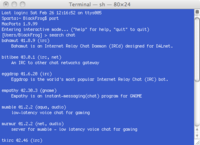MacPorts
|
| |
|
Screenshot of the port command running in Terminal | |
| Initial release | 2002[1] |
|---|---|
| Stable release | 2.3.4 / 1 October 2015 [2] |
| Development status | Active |
| Written in | Tcl and C |
| Operating system | Mac OS X, Darwin |
| Platform | x86, x86_64, PowerPC |
| Type | Package management system |
| License | BSD |
| Website |
www |
MacPorts, formerly called DarwinPorts,[3] is a package management system that simplifies the installation of software on the Mac OS X and Darwin operating systems. It is a free/open source software project to simplify installation of other free/open source software. Similar in aim and function to Fink and the BSDs' ports collections, DarwinPorts was started in 2002 as part of the OpenDarwin project, with the involvement of a number of Apple Inc. employees including Landon Fuller, Kevin Van Vechten, and Jordan Hubbard.
It allows the installation of a number of packages by entering the command sudo port install packagename in the Terminal, which will then download, if necessary[4] compile and install the requested software, while also installing any required dependencies automatically. Installed packages can be updated with the command sudo port upgrade installed.[5]
On April 28, 2005, the project released version 1.0 of their software.[6] In December 2005, the project reached a milestone, passing 3000 ports.[7] In August 2010, MacPorts version 1.9.1 surpassed 7000 ports. As of March 2013, MacPorts version 2.1.3 has over 16,500 ports.[8]
MacPorts is currently hosted on Mac OS Forge, an open source hosting service created and maintained by Apple Inc. for third-party projects not supported by Apple.[9] Best-effort support can be sourced from the community, as for any open source project.[10]
MacPorts supports universal binaries for both PowerPC and Intel-based versions of Mac OS X, but migrating from a PowerPC installation of MacPorts to a version on an Intel Mac requires reinstalling all installed ports.[11]
The official MacPorts GUI application is called Pallet and began as a Google Summer of Code project in 2009.[12] Another MacPorts GUI application is Porticus which, as of late 2011, does not support Mac OS X Lion or MacPorts versions 2.0 and later.[13]
See also
References
- ↑ "MacPortsHistory".
- ↑ "[MacPorts-announce] MacPorts 2.3.4 has been released".
- ↑ "DarwinPorts project announces New Hosting and New Name". darwinports.opendarwin.org (archived). August 7, 2006. Retrieved 2007-03-05.
- ↑ Since version 2.0.0, MacPorts has the ability to provide prebuilt archives, see [MacPorts-announce] MacPorts 2.0.0 has been released.
- ↑ "MacPorts". http://www.macports.org/. January 5, 2011. Retrieved 2010-10-15. External link in
|work=(help) - ↑ Markus Weissmann (April 28, 2005). "DarwinPorts v1.0". darwinports.opendarwin.org (archived). Archived from the original on 2006-06-29. Retrieved 2007-03-05.
- ↑ "3000 ports landmark". darwinports.opendarwin.org (archived). December 17, 2005. Archived from the original on 2006-06-29. Retrieved 2007-03-05.
- ↑ "The MacPorts Project -- Home". Retrieved 2012-03-23.
- ↑ http://www.macosforge.org/contact/
- ↑ http://www.macports.org/contact.php
- ↑ "Migrating a MacPorts install to a new major OS version or CPU architecture". MacPorts. Retrieved 2013-05-27.
- ↑ https://trac.macports.org/wiki/MacPortsGUI
- ↑ http://porticus.alittledrop.com/
External links
| ||||||||||||||||||||||||||||||||||||||||||||||||||||||||||||||||||||||||||||||||||||||||||||||||||
